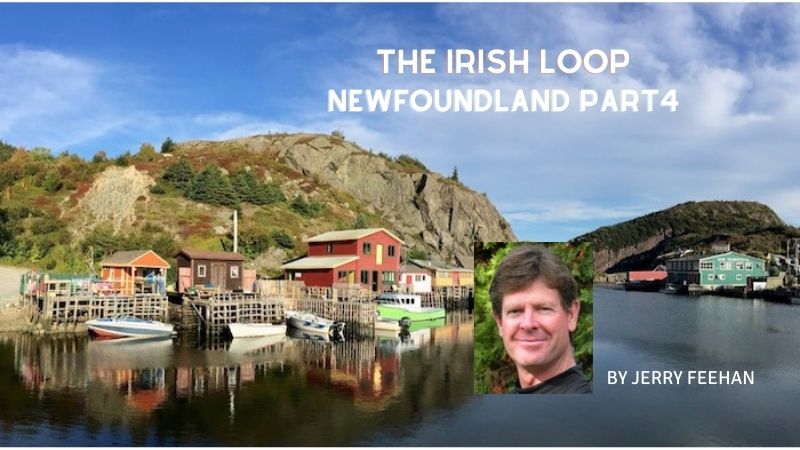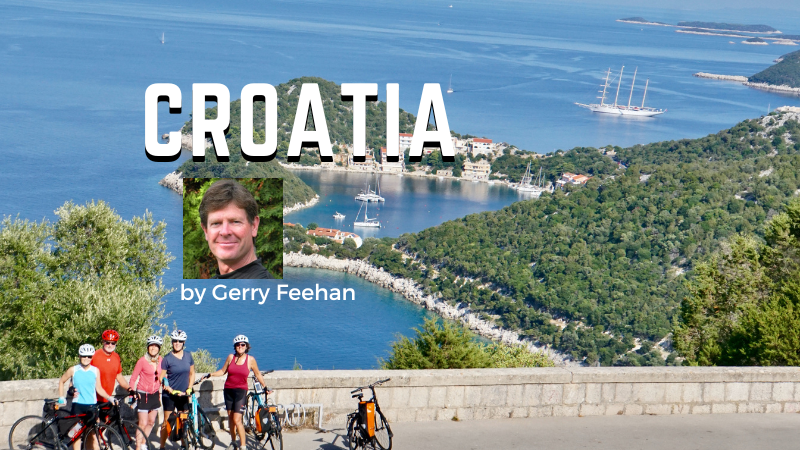Lifestyle
The Irish Loop – Part 4 of a travel series on Newfoundland by Gerry Feehan

This is the last in a four part Newfoundland series.
Scroll down to find Part 1, Gros Morne, part 2 North America’s Oldest European Settlement, and part 3 A World Famous Newfoundland Tradition.

Quidi Vidi Harbour in St. John’s
When I told a Red Deer friend (born and raised in Newfoundland) that we intended to explore only the west side of the Island during our two-week visit she looked at me as if I were daft. “If you haven’t walked down Water Street in St. John’s, you haven’t been to Newfoundland.” And so we divided our 14-day fall camping trip on The Rock equally between both sides of the Island, with the last week dedicated to St. John’s and the east coast.
Water Street was indeed a lot of frolic and fun. But frankly, narrow steep cobblestone roads and a motor home don’t play well together. So, after a few days of fine seafood, great live music, an exploration of the fascinating Rooms Museum and a bumpy visit to Signal Hill, it was time to move on from the capital. We were bound for the Irish Loop, south of St John’s, on the Avalon Peninsula. On our way out of town we stopped at Cape Spear Lighthouse, the most easterly point in Canada—and North America for that matter. The fair-haired interpreter seemed certain to have Gaelic roots (and thus knowledge of the Irish Loop) so I asked him if there were any special places we should visit. “Scottish actually,” he said, stroking his sandy beard and disavowing any Irish ancestry. “The Avalon is beautiful, you can’t go wrong. Just poke along.”
And poke we did. After exploring scenic Petty Harbour, we poked our toes into aptly named Witless Bay, where we determined that the North Atlantic Ocean is brain-
freeze cold. We camped that night in a quiet spot overlooking Witless Bay Ecological Reserve, where in early summer tens of thousands of tourists flock to see “iceberg
alley” and the vast colony of Atlantic puffins that nest annually on Great Island.
“It’s the end of the season, dearie,” said the tired camp host. “The water gets shut off tomorrow.” She looked out to sea and added, with quiet poetry, “the icebergs have
melted, the puffins have flown—now we’ve just a few stray tourists to drown.” But with a wink added, “present company excluded.” I took no offence—and swear it was by sheer inadvertence that I left the hot water running in the Witless bathhouse the next morning. For us it was an uncharacteristically early start. There must be
wisdom in that “early bird gets the worm” thing because by 8 a.m. we had encountered three different groups of hunters quartering moose by the roadside.
Hunting season had opened that day. Newfoundlanders take their moose quarrying very seriously. They are also very proud Canadians. Many yards sport a high-flying
maple leaf. But invariably the flag of Newfoundland also flaps nearby. And on the Irish Loop you’ll also see a lot of green, white and pink, the pre-1949 Dominion of
Newfoundland Tricolour.
We hadn’t planned on muzzling into other people’s moose-business but, when we encountered a newly deceased bull being roped across the highway near Ferryland,
we had little choice but to stop and make inquiries. One quickly learns as a visitor to Newfoundland that there’s no need to do more than simply open the conversation.
After that, listening will suffice. And so a roadside discourse began:
“This is how you paunch the carcass,” the senior member of the group explained while his grandson sharpened a knife and began the on-site butchering process.
“And this here’s the tenderest part,” the grandfather continued, pointing loinward. I remarked on his particularly thick maritime accent. “Ha,” one of his sons interjected, “Dad just returned from Ireland. They didn’t even ask him where he was from, although one feller did ask if he’d spent a couple of years in America.“ He and
another brother were hoisting the 400 kg animal onto a makeshift wooden frame for further dissection. Dripping sweat, he continued, “Where are you two headed?”
“Toward Trepassey,” I answered, “around the bottom of the loop and then back up toward the Trans Canada. We have an invite for Jiggs dinner on Sunday at a campground in Terra Nova.”
“Trepassey?” remarked the patriarch, cutting a strip of hide from the recently departed moose’s hindquarters. “Did you know Trepassey is in the Guinness Book of World Records as the foggiest place on earth? Last year a woman gave birth, but it was three months before they could tell if it was a boy or a girl.” The younger two
generations nodded in amused agreement.

Paunching the moose
It was certainly foggy when we rolled into town. I almost drove through the restaurant doors before spotting the bright blinking light notifying us that the village’s only eatery was closed. Apparently, the cook was out—hunting no doubt.
Someone had recommended that we stop for eats at the Squid Jigger back up the road in Calvert but that had been hours earlier. We had poked in there to see what was on the menu but decided it was too early in the day for a plate of salt-fish, potatoes and scrunchions.

The Irish Loop is a foggy place!
It was well past lunchtime when we meandered into Peter’s River. Cars were jammed outside the local hall. Perhaps a public pot luck dinner? No such luck. The entire community was gathered at the legion for “Chase the Ace,” Newfoundland’s favourite communal gambling pastime. We were getting rather peckish. With deep
regret I recalled the Squid Jigger’s daily special: cod au gratin with a side of slaw and fries.
Finally, near Point La Haye we found a corner store with doors ajar. Scurrying in, we headed directly for the deli and ordered up a couple of prime ‘Newfoundland
Steaks’: fhresh sTle iced bologna. On the recommendation of the proprietress, we chose them ‘tick’ rather than ‘tin’. At the checkout, the store phone rang. The owner
dashed off to answer. She came back, handed the cordless to the man behind us in line and said, “It’s for you John. The missus says not to forget the toilet paper.”
We parked for our picnic on a hill overlooking St. Mary’s Harbour. As the fat bologna fried on the camp stove next to a couple of happy eggs, rain began and tick fog descended. It was the tastiest meal ever.

A colourful St John’s streetGerry Feehan is an award-winning travel writer and photographer. He lives in Kimberley, BC.
 Gerry Feehan is an award-winning travel writer and photographer. He and his wife Florence live in Kimberley, BC!
Gerry Feehan is an award-winning travel writer and photographer. He and his wife Florence live in Kimberley, BC!
Thanks to Kennedy Wealth Management for sponsoring this series. Click on the ads and learn more about this long-term local business.
Gerry Feehan takes us to North America’s Oldest European Settlement
Gerry Feehan Receives the Legendary Invitation, A World Famous Newfoundland Tradition
Food and Dining
“Cook With Meg” creating community through online courses and camps for 3 years now

News release from CookWithMeg.com
VIRTUAL COOKING SCHOOL THAT STARTED DURING PANDEMIC CELEBRATES 3 YEARS
On March 23, 2020, 27 families from across Canada connected via Zoom amidst the early days of lockdown to Cook with Meg. In this 4 day virtual cooking series, they made Picky Eater Sheet Pan Pancakes, Sticky Chicken Lo-Mein Noodle Bowls, Freaky Friday Fried Rice and That’s A Lotsa Pizza D’oh using limited ingredients with former MasterChef Canada finalist Meg Tucker.
Many will remember when food products and ingredients were not readily available, so families used what they had, or what grocery stores click and collect services would provide. Through these daily cooking lessons, families not only cooked together, but formed friendships across the miles. Week after week, month after month, Cook with Meg grew to include families from Canada, USA, Mexico, Costa Rica, New Zealand and the United Kingdom.
Families became friends. We became a Cook with Meg Community.

Today, with over 6000 Zoom connections to thousands of families, the Red Deer and District Chamber of Commerce Small Business of the Year award and hundreds of five star reviews, Cook with Meg continues to thrive. Meg partners with the Egg Farmers of Alberta, Central Alberta Co-op, Alberta Pulse Growers, and Salton Canada to offer incredible experiences to families. She blends her years of experience and talents as a professional cook together by providing live and on-demand cooking classes and camps for families in six countries. Whether it’s a class tackling some of the latest food trends, attending a virtual culinary summer camp, or an adult date night class, Meg’s passion goes far beyond teaching people how to cook. It’s building life skills, it’s practicing patience, it’s building kitchen confidence, strengthening family bonds and boosting self esteem.
No matter where you live, Meg says “everyone can connect through making and sharing food”. To do that, Meg carefully designs her classes and camps in ways that help people to connect with their inner chef and the people around them.
A message from Meg: “To every person that has supported the Cook with Meg adventure. Whether you registered for a class, attended a class, liked a post on social, or shared us with your friends and family, THANK YOU. Thank you to all the families who continue to believe in the value of online learning, specifically in the kitchen. We often get asked if we will transition to “in person” classes, now that “life is getting back to normal”. I have one simple answer. I always say we know that virtual and online learning was here before the pandemic, and it’s definitely not going anywhere. I love it because for parents, you don’t have to pack your kids in the car and drive them all over town. Your kids are getting to learn in YOUR kitchen, using your own appliances and tools. There is no learning curve, only a beautiful path to KITCHEN CONFIDENCE! So the answer is no. We are a virtual cooking school and will remain as such. This allows us to keep our costs low for you, to provide families with an amazing opportunity to learn and make friends all over the world, without boundaries!”
Head to cookwithmeg.com to register for one of our upcoming classes, and watch our social as Summer Camp registration officially opens May 1.
*******************
Meg Tucker has been creating shared experiences through media for over twenty years. Creator of the Shaw TV original kids cooking show Just One Bite, and a top twenty-five finalist on Masterchef Canada, Meg’s catchy enthusiasm for life brings joy to everyone she meets in front of and behind her kitchen counter.
When the world shifted in March 2020, Meg made the ultimate pivot to build a food community called Cook with Meg..
Gerry Feehan
Croatia – Pedal and Sea

On our second day of riding, while huffing and puffing up an absurdly steep Croatian road, I said to my wife Florence, ‘Perhaps it would be wise if you were to switch to an e-bike. The guide says the grade is going to get even tougher over the next few days.’ As she pedaled away, Florence remarked, ‘You use electricity. I’ll use electrolytes.’ Then she accelerated up the slope and disappeared around a bend in the lane. I stopped disheartened, dismounted and examined my bicycle, hoping to discover a low tire or some other mechanical excuse to abandon the climb.
We were on a seven-day ‘Pedal and Sea’ adventure on the Dalmatian Coast. We’d been forewarned that it’d be a tough slog. Preparedness being my motto, I spent weeks before departure supplementing my strict training regime with long-distance cycling. The calculations were precise. Twice a week I’d do 4 kilometers of pedaling — followed by a beer and a small nachos plate. Or was it 3 kilometers of pedaling, 2 brewskies and a medium quesadilla? No matter. The critical thing was to arrive in Croatia in tiptop condition, ready to pedal.
Ironically, the town we flew into was called Split. A Roman Emperor named Diocletian was among the first to vacation on the Dalmatian Coast. He loved Split so much that, after subjugating the locals and burning a few Christians at the stake, he retired here in 305 AD and built a gargantuan palace hewn from local limestone. Today, his enormous fortress still overlooks the quaint harbour. From the palace it’s a short walk up into Marjan Forest Park, which offers splendid views of the city and the surrounding Adriatic Sea.

We boarded our bark, The Azimut in nearby Trogir. We enjoyed a spread of fresh seafood as the boat motored out of port and into the open sea. Our guides Antonio and Andrei introduced themselves and outlined the program for the upcoming week. After lunch the whole group sat on deck marveling at the pristine, azure water as the Azimut skipped across the flat sea.
Two hours later we landed on Solta island. We disembarked, mounted our steel steeds and enjoyed a leisurely ride to the stony interior of the island. We returned to the boat in time to watch the sun sink into the flaming Adriatic. Then cocktails, then a scrumptious supper, then a few late-night laughs — then off to our berths for some well-earned jet-lagged shut eye.
In the morning I emerged from our stateroom, ordered a latte and watched the crew undertake the laborious daily task of manhandling a boatload of bicycles, bucket-brigade style, from the mezzanine deck to the dock. After breakfast we gathered en masse on the quay, strapped paniers to bikes, secured helmets to heads and awaited instructions. I surveyed my fellow Azimut shipmates, many of whom donned colourful attire advertising past cycling glories. The advanced age of some instilled in me a degree of cockiness. I decided to take it easy on them this first full day of riding; let them know it was okay for old geezers and geezerettes to share the road with me. On the first steep hill four septuagenarians pedaled by me in unison, peloton-style, instantly leaving me in the dust. As they rotated away, not judging a book by its leathered cover came spinning into my mind.
The itinerary was pretty much the same each day — one beautiful Croatian Island after another, but with ever steeper terrain and longer rides. Our flamboyant, able skipper was Captain Jadran. Every morning he stood at the helm, clad in a pink shirt, orange shorts, flip flops and a groovy Navy hat, part Humphrey Bogart, part Austin Powers. A cigarette dangled perpetually from his lips, which he removed only to shout sharp commands at the crew.

Our dapper Captain
There were 36 guests on board the Azimut. Antonio and Andrei our large, male mother geese, patiently and attentively looked after the whole flock, guiding us from start to finish every day, on every ride. They replaced chains felled by faulty gear changes, fixed flattened tires and bandaged the occasional scrape.
Although most of us started out using good old-fashioned human power, slowly but surely more and more e-bikes started popping up on the quay in the morning.
Before the week was half over the hard-core contingent was whittled down to less than ten. And those that made the switch did not switch back. But they certainly smiled a lot more. E-bikes have enabled the family to play together — and stay together. If mom is hard-core but dad and the kids aren’t as enthusiastic, they can still bike together the live-long day.

Fantastic Views

Pristine Harbours
Spoiler: we were not the first travellers to discover Croatia. Although we arrived in September’s shoulder season, the ports, even at smaller remote islands, were crowded — boats often stacked 6-deep, necessitating a circuitous, ship-to-ship hopping expedition to get ashore. Dubrovnik, the gem of Dalmatia, was crawling with visitors. Circumnavigating the City’s famous wall, a 2-kilometre stretch offering heavenly views of the ancient city and port, was a push and shove affair.
Fortunately, we didn’t spend too much time with the maddening crowd. Our days were occupied riding bucolic island byways, our nights rocking on board with the boisterous satisfaction of having conquered thigh-burning mountain passes.
Most of our ocean crossings took less than a couple hours and land was always in sight. The longest haul was from Hvar to the island of Vis — a two-pack sail for the captain. At the height of cold war fears, communist strongman Marshal Tito installed a secret submarine base along Vis’ rugged coast. But frankly, after an arduous cross-island ride, I was less interested in consuming cold war trivia than in downing a large serving of Viska, traditional island dough aroused with olive oil and stuffed with onion, anchovies and tomatoes.

Lunch!

Relaxing on deck after a hard day
The toughest ride was on Korcula. This leg was only a little over 50km, but there were several brutal climbs. Fortunately the pain was abated by frequent stops to admire the stunning white limestone cliffs spilling into the aquamarine Adriatic. The day ended at a small roadside shop where we quaffed a well-earned Radler (a delicious concoction of flavoured soda and beer) purchased from an indifferent Korculan shopkeeper. To be clear, not all Croatian shopkeepers are indifferent.
Some are also grumpy.

Radler time
On our last night on board the ship, at the Captain’s dinner, Jadran thanked us and offered a toast to all his guests. I manufactured an impromptu rendition of the Azimut Blues on my ever-present ukulele. When I finished the ditty, the captain, who had exchanged his colourful garb for proper navy attire, ceremoniously adorned me with a Croatian captain’s hat. An unlit smoke hung from his lips. I looked down at his feet: flip-flops.
Gerry
If you go: https://www.pedalandseaadventures.com/

Lights out
Gerry Feehan is an award-winning travel writer and photographer. He lives in Kimberley, BC.

Thanks to Kennedy Wealth Management for sponsoring this series. Click on the ads and learn more about this long-term local business.
-

 Business1 day ago
Business1 day agoFeds Spent Roughly $1 Billion To Conduct Survey That Could’ve Been Done For $10,000, Musk Says
-

 Alberta19 hours ago
Alberta19 hours agoPhoto radar to be restricted to School, Playground, and Construction Zones as Alberta ends photo radar era
-

 2025 Federal Election2 days ago
2025 Federal Election2 days agoChinese Gangs Dominate Canada: Why Will Voters Give Liberals Another Term?
-

 Health21 hours ago
Health21 hours agoRFK Jr. Drops Stunning Vaccine Announcement
-

 Alberta13 hours ago
Alberta13 hours agoProvince announces plans for nine new ‘urgent care centres’ – redirecting 200,000 hospital visits
-

 Business10 hours ago
Business10 hours agoElon Musk, DOGE officials reveal ‘astonishing’ government waste, fraud in viral interview
-

 Energy2 days ago
Energy2 days agoEnergy, climate, and economics — A smarter path for Canada
-

 Alberta2 days ago
Alberta2 days agoAlberta Institute urging Premier Smith to follow Saskatchewan and drop Industrial Carbon Tax






